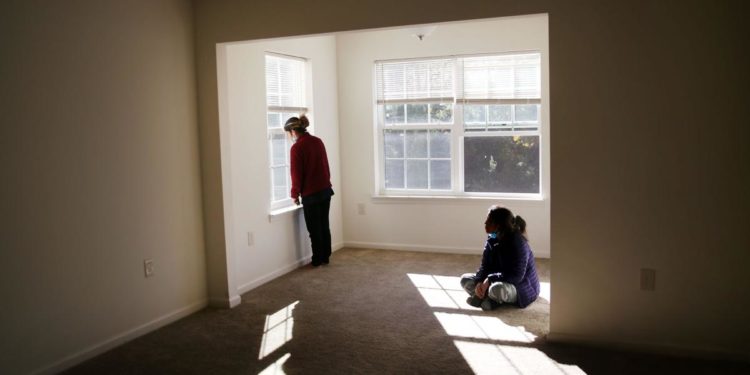Muzhda, 25, has found a new home in the New River Valley. The Afghan woman fled during the Taliban takeover in August with her sister. Both had been serving in the Afghan military.
Shrouded in a black head-to-toe burqa, Muzhda peeked through two eye holes and got into a taxi as the hot August sun started to rise. She did not have time to think about leaving her entire life behind. At age 25, this was her first time wearing a burqa. She had to conceal her identity from the Taliban.
The typical 20-minute drive to the airport took hours. She was afraid for her life. She thought the Taliban might arrest or even shoot her. She said she had done many interviews with journalists in Kabul as part of her work with the U.S. military that occupied Afghanistan. She was scared someone would report her. As the taxicab sat in a traffic jam with others heading in the same direction, she held her breath at each checkpoint.
Her older sister Shekiba was already at the airport — both were serving with the U.S.-supported Afghan military — and they had received a phone call from connections that would help them escape. [The Roanoke Times is withholding their identities for the safety of their family members still in Afghanistan.]
People are also reading…
When she arrived at Kabul International Airport, already chaotic amid the U.S. withdrawal and pending Taliban takeover, Muzhda used WhatsApp on her phone, her only belonging, to connect with her sister. But there was more sitting and waiting outside and the August sun grew extremely hot. Hours went by with no food or drink as they waited to get word for entry to the base. They periodically changed locations to avoid suspicion. Parched, hungry and sweating under the long thick garments, they sat on the ground with their teenage brother. They watched horrific scenes just on the other side of the gate. As members of the military, it was hard for the sisters to feel so helpless in the situation.
People ran toward planes while waiting for entry. Muzhda saw a woman get trampled because her burqa got caught in a crowd as she tried to climb a fence. She saw people hiding in the wheels of an airplane, and then falling to their deaths when it took off.
As the day turned to night and their sweat began to feel like icicles, their military connections reached out, and escorted them onto a U.S. Air Force plane. An American lieutenant colonel of Afghan origin arranged for assistance for the sisters to be taken onto a departing flight.
“He didn’t know who I was, except that I had served in the Special Forces. He wanted nothing in return except our safety,” Muzhda said.
Sitting shoulder to shoulder on the floor of a C-17 with nearly 100 other people, they flew from Kabul to Qatar. Still without food or drink and now freezing, they could not see through the windowless transport aircraft the home they were leaving.
They also could not imagine that their journey would take them across the world to the Blue Ridge Mountains of Virginia.
It was not supposed to be this way. On a Friday, just days before, the sisters both dressed in long, colorful, elegant gowns while attending a friend’s wedding at one of the most elite wedding palaces in the city. They danced in a giant ballroom with golden chandeliers and an imperial staircase.
Muzhda wore stiletto heels, her long hair dazzled up into a ponytail, as she wore a striking patterned gown of yellows, blues, purple and green. On the way to the wedding, the sisters discussed that this could be their last time seeing good friends for a while. People were worried. The Taliban had taken over all the provinces of Afghanistan. But they also thought things would be OK. They knew Afghanistan had a good military that could stop the Taliban.
“I am like, ‘When they come we just shoot them. No need to be scared or run,’” Shekiba said.
By Sunday, when Muzhda reported for work on the American base, hardly anyone was there. She received a phone call from her sister that the Taliban was taking Kabul and would be searching their homes. Her commander gave her permission to go home. They tore up all their military certificates and documentation, deleted all the photos from their phones.
And then Muzhda looked out the window and saw something she still cannot believe.
“I saw the flag of the Taliban. I see it with my eyes, but up to now, two months or more, I can’t believe it. It was very difficult.”
The sisters and their younger brother were aboard the military plane for almost 18 hours, before landing in Qatar. They stayed two weeks in that country, before arriving at a makeshift military base filled with white tents in New Mexico. While at the U.S. resettlement camps for Afghan refugees, they were vetted and vaccinated.
On a brisk October evening, they arrived at Roanoke-Blacksburg Regional Airport.
Volunteers with Blacksburg Refugee Partnership, including Scott Bailey, the group’s president, and Jennifer and Dale Pike with their two sons, were ready to welcome them.
Dale Pike knew the sisters had no money during their travels so he reached out to the volunteer desk at Hartsfield-Jackson Atlanta International Airport where they had a three-hour layover and arranged for them to have a place to rest at the MinuteSuites and have dinner.
They reached the Roanoke airport at 11 p.m. “Muzhda?” Bailey said, getting her attention as the sisters left the terminal area. Muzdha looked up. The reality of their escape was just starting to sink in.
“We lost our everything,” she said.
The sisters and their brother waited for their luggage containing some clothes that were donated to them and an oversized blanket they did not want to leave behind in New Mexico after having been subject to the desert’s extreme cold nights, as if the cold they felt when escaping Kabul never left. Muzhda showed photos of her 3-year-old niece still in Afghanistan, sent to her on WhatsApp from her other sister. The child was not speaking to her at the time because she was upset with her aunts for leaving her behind.
Concern for women under the Taliban
Drinking green tea at the Inn at Virginia Tech, the sisters sat with Bailey as they waited to meet members of the Muslim Student Association. They stayed at the hotel until Blacksburg Refugee Partnership made their new apartment ready for them in the New River Valley. In the meantime, Bailey was doing all he could to help the sisters feel more comfortable in their new place by helping to arrange the meeting.
Three young students approached, smiling. The strangers seemed to hit it off right away. One student asked, “Do you speak Urdu?” No, they speak Dari, the sisters replied, but the languages are similar, so they chatted in their native tongues, laughing and smiling. They discussed the recent Virginia Tech football game. The students invited the sisters out to eat at a local burger place and to the mosque. They hugged before saying goodbye.
As they undertake a new life in the United States, the sisters are telling their story because they hope it helps the people left behind in Afghanistan, especially women, who have seen freedoms gained during the last 20 years evaporate under the reemergence of Taliban’s harsh religious regime. They are not using their real names and discussing details of their military backgrounds in order to protect their identities and family and friends back home. They also prefer not to state publicly where they have resettled in the New River Valley.
“I need attention about the women because the men in the last year have been working on the first line of the missions, and the Taliban, they killed them,” Muzhda said.
“So right now [the women] have a lots of babies and no husband. Right now how can she work because in the Taliban government they have no place to work for a woman, so how can she work? How can she cook some food for their children?”
Their older sister still in Afghanistan had to quit her job as a chef because the Taliban does not allow women to work, and their nieces were pulled out of school after the Taliban takeover.
Shekiba shows a disturbing video sent to her on WhatsApp from her military peers still in Afghanistan. The video shows members of the U.S.-backed Afghan military found dying on a floor after fighting broke out with the Taliban.
The sisters want the world to know people are still there who need help.
Muzhda had slept well for the first time in their temporary housing since fleeing Kabul. She had been staying up late to talk to her family in Afghanistan, where it was daytime. Perhaps she felt a comfort in knowing today she was moving into her new home, or because of the local Afghan families who delivered Afghan food the night before. Now, the sisters would have a stove for cooking and a place to make their home.
Tears came to Muzhda’s eyes when they entered the apartment. Her sister and brother looked around and explored each of the three bedrooms. Muzhda stayed in the entryway in silence.
The moment did not last long. It’s down to business, as a refugee partnership volunteer who drove them to their new home helped the sisters figure out some paperwork. She let them know other volunteers would arrive shortly to move in items for a fully furnished apartment.
The sisters sat on the empty living room floor in silence. Birds chirped outside the open window where a slight breeze wafted through from the forest behind the building. The muffled noise of a television could be heard from another apartment. “When did she say they would be here?” Shekiba asked. They are not sure.
Fifteen minutes later, someone knocked at the door. A continuous stream of volunteers entered with boxes of all sizes, carrying beds, dressers, kitchen supplies, blankets and rugs.
“Where do you want this bookshelf?” a volunteer asked. Here…here… “No here,” said Shekiba. She quickly found a drawing made for them by a young girl who lived across the street from one of the temporary houses where the sisters and their brother lived after they arrived.
The drawing shows three hearts, ice cream cones and a little blond-haired girl in a purple dress, her arms wide open with the words, “Welcome Home!” Shekiba taped it to the side of the bookshelf.
Noemi Short, 6, of Blacksburg, at left holds a picture she drew for Muzhda, Shekiba and their brother when they moved to temporarily housing in early October. The sisters became friends with Noemi and her mother, Alyssa Short, who went for walks with the family and made them feel welcomed.
The Pikes, the couple who met them at the airport in Roanoke, had been storing many of the donations for Afghan refugees from the community at their house. Jennifer Pike was relieved as she watched a blue couch squeeze through the door. She had stayed awake the night before as she fretted about the logistics of moving the heavy furniture.
“I was worried if it would fit through the door, would volunteers be able to lift the heavy couch bed, could it fit on the trucks?” Pike said. “ I did not want it to get dirty or anyone to get hurt.”
Some volunteers started to unpack boxes filled with kitchen items and food.
“Do you know how to use these?” someone asked the sisters, holding up coffee filters. They do.
Shekiba saw a small sewing kit and was excited. “Wow! In Afghanistan I have this, but big and a lot.”
As two volunteers worked to make sure a dresser drawer fit just right, Muzhda remembered her room in Kabul. “Lots and lots of things,” she said, recalling all her clothes and accessories.
“And now it’s all gone,” Shekiba said.
“Do you want to keep this?” a volunteer asked about a donated painting of downtown Blacksburg. “Yes,” Muzhda said as she picked a place front and center on a wall in the living room.

Jennifer Pike, left, a volunteer with Blacksburg Refugee Partnership helps Muzhda hang a donated artwork in the living room of her new apartment on Oct. 20.
They hung a football poster for their brother who loves sports and was happy to have it. I can get you more of those, said the volunteer. “Any other kind of artwork you like?”
Muzhda said she loves Barbie and dolls, specifically Cinderella. She likes the Disney character because, “She was a good person, even when being treated so badly and God rewarded her,” she said.
Another Afghan refugee who recently moved to the apartments came by with his 1-year-old son. He asked Bailey about finding work.
“As soon as we get everyone moved in, let’s talk about what jobs you might like and what’s available,” Bailey said, adding: “It takes time.”
It takes about one month for a work authorization, one month for a Social Security card and a year or more for a green card, which allows non-US citizens to get permanent residence.
Three hours later the move-in wrapped up. “Are you going to be OK staying in one place for a long time?” Bailey joked with the sisters. Over two months had passed since the evacuation. Since then, they had been relocated at least five times.
Before saying goodbye he said, “If it’s important to you, it’s important to us. We can’t do everything quickly but we’ll get it done.”

The sisters serve traditional Afghan cooking for the first meal in their new home. The dishes include Biryani, a mixed rice dish, with chicken, and Borani Banjan made with eggplant, tomato, yogurt, garlic and pickled vegetables.
Waiting for new beginnings
The smell of garlic filled the air of their new apartment as Muzhda fried the minced cloves with eggs, tomatoes, onions and salt. The siblings sat down with a soft loaf of bread and broke off pieces to eat with the savory eggs.
“We eat a loaf of bread between the three of us for breakfast,” Muzhda said.
After breakfast they listened to music on YouTube by a famous Afghan singer-songwriter Aryana Sayeed. Muzhda said she likes her because she sings a lot of songs for women.
A feeling of unsettledness began to sink in with the newfound stillness. Their bustling lives in Kabul were rich with family, friends, work and school. Now all they could do was wait. Wait for Social Security cards, insurance cards, change of address. Wait to learn what would happen with their education, wait for volunteers to take them grocery shopping or for food and clothes. Wait to learn how to use the bus.
Shekiba got lost for a couple hours when she went for a walk. They had their phones, but no internet service yet to use GPS.
Muzhda sent a message on a WhatsApp group thread with the refugee partnership that she was bored, and that afternoon a few BRP volunteers stopped by to keep her company on a walk.
“They are so kind, they are really caring about us,” she said, adding that she will not send a similar message again. “I feel bad. I know they are all very busy.”
Partnership volunteers were more than willing to help. One drove them an hour to Bethlehem Grocery in Roanoke where the sisters could find the specific rice they wanted. The Thai rice from the area Kroger cooked too mushy, another brand of rice from the local market was better but not quite right. They wanted Aahu Barah, a brand of basmati rice, and Roanoke was the only place to find it.
Volunteers brought them to stores in the New River Valley to help them pick out their own clothes. The sisters love to shop, but it was hard to find their style in the college town. “All the shirts are too short,” Muzhda said.
She showed some longer form fitting tops she found online: A tan-colored one with a cowl neck, the other, blue with a short V-neck.
Marnie Mills, the Mission Advancement Associate with Commonwealth Catholic Charities said in an email to The Roanoke Times that, since mid-September, CCC has welcomed over 130 Afghan adults and children to Roanoke and surrounding areas. All three CCC office locations across Virginia have resettled more than 550 Afghan adults and children. The nonprofit is one of the largest resettlement organizations in Virginia.
“We are so grateful to have the support we have in Roanoke,” Mills said about the additional support from community groups, religious organizations and volunteers.
“One of the biggest challenges we continue to face is affordable housing in this unstable and uncertain housing market,” Mills wrote. There is also a need for household items and bedding.
The sisters found their way to the New River Valley through a network of tireless people that included U.S. military personnel who served with them in Afghanistan, CCC, BRP and The Secular Society.
The Secular Society is a Blacksburg-based organization that has worked closely with BRP and is paying to support five of the refugees and their families as they pursue the completion of their education and careers. The refugees being supported by the society are called The Secular Society Scholars. One additional scholar is undergoing a standard background check and is expected to arrive soon.
When the Taliban took over in August, BRP and The Secular Society wanted to help women who could no longer attend college.
“We were seeking out women who were forced out of the country, and who were not able to complete their education goals,” Bailey said.
He reached out to many contacts, and it was Atia Abawi, an author and former reporter with CNN and NBC and a foreign correspondent based in Kabul, who put him in contact with the military women.
Abawi had worked with the lieutenant colonel at the Kabul airport to help the sisters and their brother escape as the city was falling to the Taliban.
Muzhda helped, as well, by introducing some of the families to BRP and The Secular Society. “They are so kind, and accepted and do their best for every family.” she said.
The Secular Society Scholars include military women who were working to further their education, some of them with younger siblings and children. One was an officer, others were serving in the Afghan Female Tactical Platoon. One had three semesters remaining to get her Ph.D. in political science and wanted to be a judge.
BRP is also helping a married couple with a 1-year-old son. The father was working as a guard for the U.S. embassy for six years, and the mother was an elementary school teacher. He is the same man who asked Bailey about possible jobs as Muzdha, Shekiba and their brother moved into their new apartment.
“The new families are all educated, where the first families we worked with did not have any education, and many of them could not even write in their own language,” Bailey said.
“It’s just a lot different, because we are going to be able to work with them over a longer time period, and they’re going to be able to do more with their scholarships.”
Bailey explained that refugees arrive at their resettlement with only a $1,000 stipend for each person from the U.S. government.
BRP called out for donations of home furnishings for all the families, and volunteers and the community responded. Volunteers stored the furnishings in their home garages and organized move-ins and logistics for the newest six families.
“We have a lot of great volunteers,” Bailey said. “Blacksburg is an incredibly welcoming place. We are called the Blacksburg Refugee Partnership for a reason.”
Currently BRP is looking for help with transportation and, in some cases, childcare. “We’re trying to get them all working, or in school. And there’s still a lot of doctor’s appointments and stuff like that,” Bailey said.
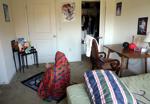
Prayer rugs were donated for Afghan refugees through Blacksburg Refugee Partnership. Muzhda prays for the women of Afghanistan and her family and friends now living under the Taliban rule.
Being around friends and knowing they are safe feels comforting, still the sisters’ future is uncertain and they reminisce about home.
“Before, I had a very good life, my job, my home, my university,” Muzhda said. She showed a photo of her niece, the one who refused to speak to her before, but is now chatting with her and her sister daily.
Muzhda was one semester from completing her degree to be a midwife. Shekiba was almost done completing her degree to be a dentist.
In Afghanistan, the sisters spent their free time shopping in the large city market square and vacationing at Kapisa Province where they swam in the river.
“The Kabul was not the Kabul before 20 years [ago],” Muzhda said, describing the Afghan capital in the years that followed the United States invasion after the 9/11 attacks in 2001.
“We have a lot of universities, a lot of schools, a lot of journalists, and families gives permission to their daughter to go to the media to go in front of the camera and talk. We have a lot of singers, a lot of pilots.
“The situation was not like it was before the 20 years ago when the Taliban was the government.”
Shekiba remembered the first time she saw a woman on television driving an army vehicle in uniform. “I saw them and after that it would be me with gun and with helmet. At that time I like it.
“In my opinion it was very important [to join the military]. It was our wish. You guys [Americans] are open minded, and I like that.”
Muzhda saw her big sister in service and also wanted to join. She liked the good benefits and the opportunity to learn English and about computers. She wanted to be a pilot.
Her mother hesitated, saying she already had to worry about one daughter in the military. She eventually relented, asking Muzhda to please finish her high school education first.
In her last year of high school, Muzhda attended the Air Force University in Afghanistan and became an officer and a mechanic on PC-12 passenger and cargo aircrafts with the main goal to become a pilot. She had been taking classes for six months of the 18 to 24 month program when the Taliban regained control of the country.
Still, she hopes to continue her military career. “One day I hope I can do something for the U.S. government because they have done so much for Afghanistan for 20 years.”
Shekiba wants to become a dentist, having been inspired after seeing a peer who was shot in the mouth and needed major dental work.
“I like the dentist because in Afghanistan all men and women have tooth problems and tooth is the beauty of the face,” she said, adding “dentistry should help for this. If your tooth is good, you are eating good. You are strong.”
One Friday morning in November, Muzhda was excited. She had just returned from the apartment gym and was making chicken kebabs with onion and red pepper.
“I hope they taste good,” she said. She was trying to make them just like her younger sister who is still back home in Afghanistan. Vegetable oil splattered in the pan as she turned the skewer.
“Our mentors are coming,” she said, referring to two women she and her sister served with in Afghanistan. The women were also in their 20s, born in the United States. They are active duty soldiers based at Fort Bragg in North Carolina. They are also a part of a Sisters of Service, working to empower and resettle the Afghan females who fought by their sides.
Muzhda tried a bite of the sizzling, steaming dish. “Not enough spice,” she said. “Needs more garlic, more salt.”
When the women arrived, everyone hugged and smiled. Shekiba had not yet returned from an appointment. Muzhda served ginger tea and she and the two soldiers sat in the living room catching up.
Muzhda talked about her worry of competing for her education in the states and about being one semester short of completing her midwife degree in Kabul.
“If they say start from beginning I cannot do that, it will be very boring for me,” she said, concerned that her college credits will not transfer to the United States.
The mentors want to remain anonymous for safety reasons. However, one spoke about the importance of mentorship. “They crossed so many barriers in Afghanistan,” one of the soldiers said, adding “They fully have the potential to succeed in the United States. This is why it’s so vital to have a mentor who can help navigate this new system.”
Muzhda joined the military when she was 19 and in 12th grade. She was scheduled to begin college the next year as a journalism major, but her mother died unexpectedly. Muzhda put some of the burden on herself, thinking she had caused her mother so much stress by joining the military. She wanted to honor her mother’s wishes that she become a midwife, so she changed her course of study.
In January, the sisters and other Afghan refugees began their education journey with English classes five days a week. When they have completed those classes, they will have an opportunity to pursue their education goals.
The future is still unclear for Muzhda and Shekiba. They still don’t know how many of their college credits from Kabul will transfer to U.S. schools.
Muzhda returned home to the apartment from English class excited to share what she learned about Martin Luther King Jr. She had not heard of him, and she liked that he stood for equality.
Her college track is uncertain but the military expert and midwife-in-training has settled for a cashier’s job. Muzhda still has sleepless nights, as she worries about her family stuck in Kabul, but like a typical college student, she battles her fatigue with a cup of coffee in hand as she leaves for class, and as for her uncertainty, she battles that with hope.
Photos: Afghan sisters start their new lives in Southwest Virginia

After fleeing for their lives in Afghanistan, sisters Shekiba, 30, left, and Muzhda, 25, find a new home in the New River Valley. The Afghan women fled during the Taliban takeover in August. On Oct. 20 they wait in their new, empty apartment for Blacksburg Refugee Partnership to arrive with donated furnishings from the community. The sisters’ identities are being withheld for the safety of their family still in Afghanistan.
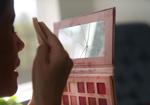
Shekiba uses a makeup compact given to her by an American military member she served with in Afghanistan. The mirror was cracked as she fled during the evacuation from Kabul International Airport, and was one of her only belongings she escaped with.

Members of the Muslim Students Association at Virginia Tech welcomed Muzhda, Shekiba, and their brother to the area while staying at Inn at Virginia Tech their first week after being relocated from a U.S. resettlement camp for Afghan refugees. (From left) Amaan Raheem, Yusera Ishrat, and Maha Shoaib.

The sisters serve traditional Afghan cooking for the first meal in their new home. The dishes include Biryani, a mixed rice dish, with chicken, and Borani Banjan made with eggplant, tomato, yogurt, garlic and pickled vegetables.

Muzhda approaches her new home in the New River Valley on Oct. 20 after fleeing for her life during the Taliban takeover of Afghanistan in August.
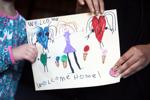
Noemi Short, 6, of Blacksburg, at left holds a picture she drew for Muzhda, Shekiba and their brother when they moved to temporarily housing in early October. The sisters became friends with Noemi and her mother, Alyssa Short, who went for walks with the family and made them feel welcomed.

Volunteers with Blacksburg Refugee Partnership move in home furnishings for Shekiba, Muzhda and their brother, donated by members of the community for Afghan refugees.

Jennifer Pike, left, a volunteer with Blacksburg Refugee Partnership helps Muzhda hang a donated artwork in the living room of her new apartment on Oct. 20.
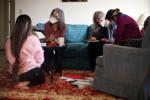
English tutor volunteers with Blacksburg Refugee Partnership, Anne Abbott, left, and Cathy Vanderburgh, right center, help the sisters with homework and topics covered in their English as a Second Language classes. The recent Afghan refugees attend the class four hours, five days a week intended to prepare them for college classes.

Scott Bailey, President of Blacksburg Refugee Partnership makes Muzhda smile for her first time since escaping Afghanistan. “Are you going to be okay staying in one place for a long time?” he joked. Over two months had passed since the sisters fled for their lives during the Taliban takeover of Afghanistan. They had been relocated at least five times, and in October were moving into their new home.

Muzhda prays for the women of Afghanistan and her family and friends now living under the Taliban rule. Her older sister still in Afghanistan had to quit her job as a chef because the Taliban does not allow women to work, and her nieces were pulled out of school after the Taliban takeover.

Prayer rugs were donated for Afghan refugees through Blacksburg Refugee Partnership. Muzhda prays for the women of Afghanistan and her family and friends now living under the Taliban rule.
Heather Rousseau, a photojournalist for The Roanoke Times since 2015, is the 2021-22 Secular Society Fellowship recipient. Her work is focused on refugees and immigrants in the Roanoke region.
Credit: Source link

